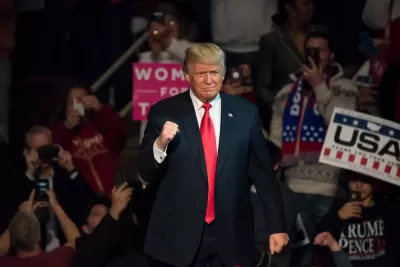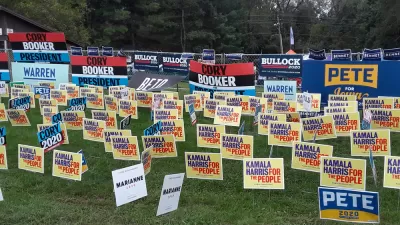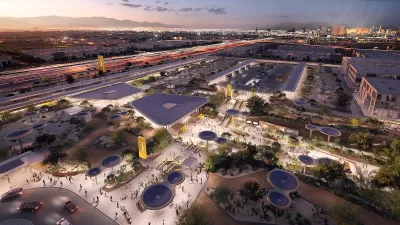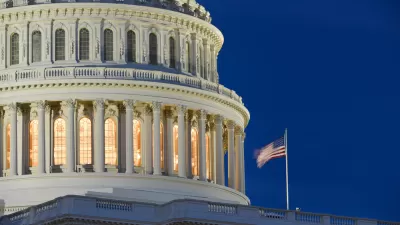The Trump Administration is sending out mixed signals on public transit issues. Why?

In its first week, the Trump Administration sent mixed signals on transportation issues. Part of the Trump transition team is drafting a budget, and some leaks suggest that this budget will include large spending cuts in a wide variety of federal programs. Apparently, early budget drafts are based on the Heritage Foundation’s budget proposals. Since Heritage wants to wipe out funding for public transit, it is possible that the Trump budget could support similar policies.
On the other hand, the transition team has been working with a list of infrastructure projects that the incoming Trump Administration might support. [Ed's note: the veracity of this draft list has been disputed, but McClatchy has since verified the exact origins of the list.] Even though the list includes road and air projects, it also includes:
- High-speed rail between Houston and Dallas;
- Commuter rail from Dallas to Fort Worth;
- Expansion of New York City's new Second Avenue subway;
- The Purple Line, a light rail line running through Washington’s suburbs;
- Detroit’s M-1 streetcar projects; and
- Extensions of Boston's Green Line trains.
What's going on? Since the Trump campaign speculated about public-private partnerships, it might be the case that the Trump Administration likes transportation as long as it is financed in nontraditional ways. And if we had a conventional President, who expected to win the election and whose transition team had been in place long before the election, this version of reality would seem persuasive to me.
But it seems to me that this administration might be a bit more disorderly than most. I'm not sure that President Trump ever expected to win the election, and transition head Chris Christie was fired a few days after the election. He was replaced by Vice President Pence, who seems to be a more orthodox, anti-government conservative than President Trump.
Under the circumstances, it might be the case that groups within the transition team aren't really speaking to each other, and so the anti-government types in "Office A" haven't coordinated their proposals with the infrastructure-lobby types in "Office B." Ultimately, President Trump may have to arbitrate disputes between his administration's moderate and conservative wings—and then Congress will have to decide to what extent it should uphold his verdict.

Alabama: Trump Terminates Settlements for Black Communities Harmed By Raw Sewage
Trump deemed the landmark civil rights agreement “illegal DEI and environmental justice policy.”

Study: Maui’s Plan to Convert Vacation Rentals to Long-Term Housing Could Cause Nearly $1 Billion Economic Loss
The plan would reduce visitor accommodation by 25% resulting in 1,900 jobs lost.

Planetizen Federal Action Tracker
A weekly monitor of how Trump’s orders and actions are impacting planners and planning in America.

Wind Energy on the Rise Despite Federal Policy Reversal
The Trump administration is revoking federal support for renewable energy, but demand for new projects continues unabated.

Passengers Flock to Caltrain After Electrification
The new electric trains are running faster and more reliably, leading to strong ridership growth on the Bay Area rail system.

Texas Churches Rally Behind ‘Yes in God’s Back Yard’ Legislation
Religious leaders want the state to reduce zoning regulations to streamline leasing church-owned land to housing developers.
Urban Design for Planners 1: Software Tools
This six-course series explores essential urban design concepts using open source software and equips planners with the tools they need to participate fully in the urban design process.
Planning for Universal Design
Learn the tools for implementing Universal Design in planning regulations.
Caltrans
Smith Gee Studio
Institute for Housing and Urban Development Studies (IHS)
City of Grandview
Harvard GSD Executive Education
Toledo-Lucas County Plan Commissions
Salt Lake City
NYU Wagner Graduate School of Public Service






























